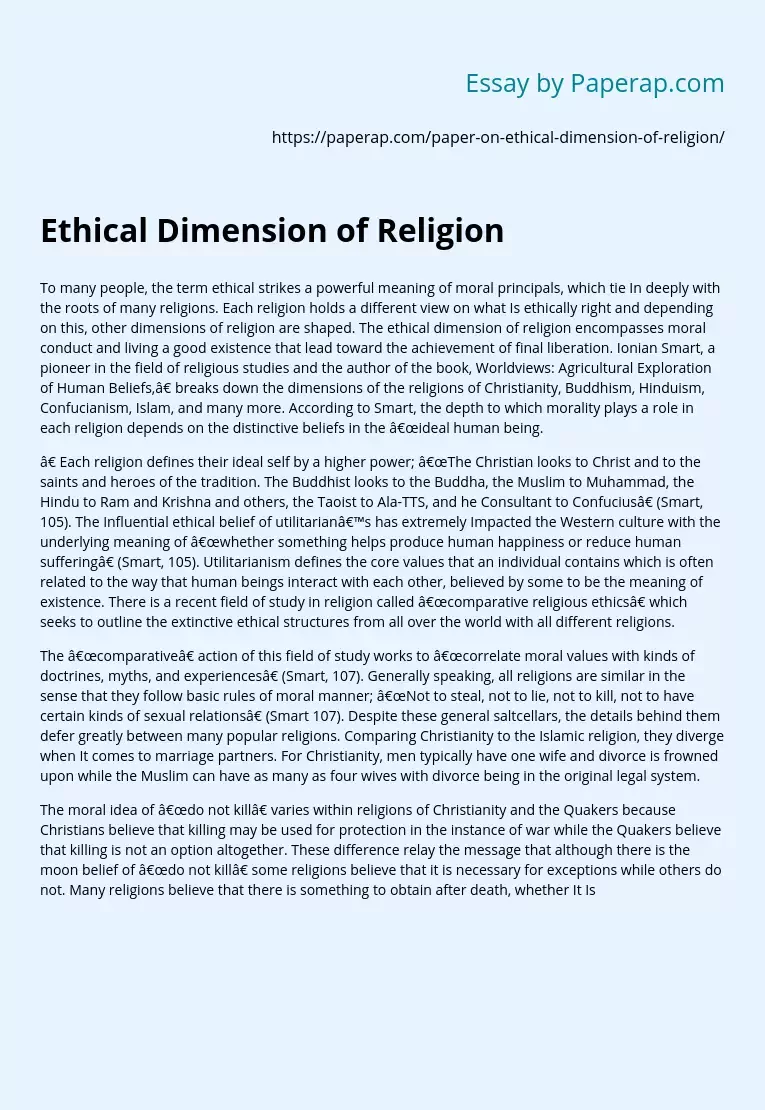Ethical Dimension of Religion
To many people, the term ethical strikes a powerful meaning of moral principals, which tie In deeply with the roots of many religions. Each religion holds a different view on what Is ethically right and depending on this, other dimensions of religion are shaped. The ethical dimension of religion encompasses moral conduct and living a good existence that lead toward the achievement of final liberation. Ionian Smart, a pioneer in the field of religious studies and the author of the book, Worldviews: Agricultural Exploration of Human Beliefs,” breaks down the dimensions of the religions of Christianity, Buddhism, Hinduism, Confucianism, Islam, and many more.
According to Smart, the depth to which morality plays a role in each religion depends on the distinctive beliefs in the “ideal human being.
” Each religion defines their ideal self by a higher power; “The Christian looks to Christ and to the saints and heroes of the tradition. The Buddhist looks to the Buddha, the Muslim to Muhammad, the Hindu to Ram and Krishna and others, the Taoist to Ala-TTS, and he Consultant to Confucius” (Smart, 105).
The Influential ethical belief of utilitarian’s has extremely Impacted the Western culture with the underlying meaning of “whether something helps produce human happiness or reduce human suffering” (Smart, 105). Utilitarianism defines the core values that an individual contains which is often related to the way that human beings interact with each other, believed by some to be the meaning of existence. There is a recent field of study in religion called “comparative religious ethics” which seeks to outline the extinctive ethical structures from all over the world with all different religions.
The “comparative” action of this field of study works to “correlate moral values with kinds of doctrines, myths, and experiences” (Smart, 107). Generally speaking, all religions are similar in the sense that they follow basic rules of moral manner; “Not to steal, not to lie, not to kill, not to have certain kinds of sexual relations” (Smart 107). Despite these general saltcellars, the details behind them defer greatly between many popular religions. Comparing Christianity to the Islamic religion, they diverge when It comes to marriage partners. For Christianity, men typically have one wife and divorce is frowned upon while the Muslim can have as many as four wives with divorce being in the original legal system.
The moral idea of “do not kill” varies within religions of Christianity and the Quakers because Christians believe that killing may be used for protection in the instance of war while the Quakers believe that killing is not an option altogether. These difference relay the message that although there is the moon belief of “do not kill” some religions believe that it is necessary for exceptions while others do not. Many religions believe that there is something to obtain after death, whether It Is life after death In the form of reincarnation or reaching the ultimate goal of a perfect human being, called nirvana. In Hinduism they follow the rules of morality within the “eightfold path” and believe the eventual objective of existence Is to reach nirvana. To do so, followers of this religion must abide by the law, which they believe is important aspect of this is the idea of karma, known to represent ones actions in their lives and what comes after those actions; “Karma is the law of reward and penalty within the framework of rebirth, in which my status as human or animal or whatever results from my acts in previous lives” (Smart, 107).
The “eightfold path” is a perfect example of the ethical dimensions of Buddhism that leads to achieving deliverance. The major concept of ethics is the decision of what is right and wrong and who or what decides what is right and wrong. Based on the ideal human being that each religion idealizes, everlasting freedom after death is decided. Despite all the difference that each religion specifically has, they all contain a “sense of the Beyond in order to see anew the sacredness of the person” (Smart, 117). Moral conduct and living a good existence eventually leads to “the attainment of the final release, or at least toward getting a better life next time around (Smart, 1 13), which ultimately summarizes the concept of the ethical dimension of religion.
Ethical Dimension of Religion. (2017, Nov 22). Retrieved from https://paperap.com/paper-on-ethical-dimension-of-religion/

